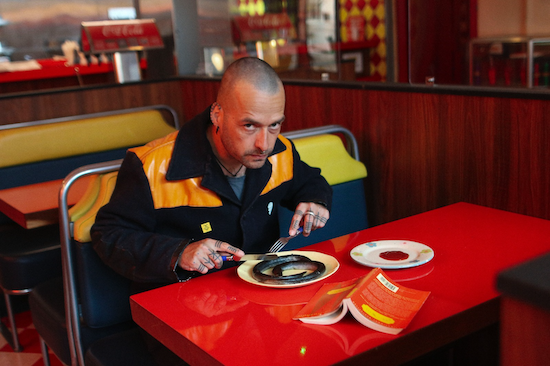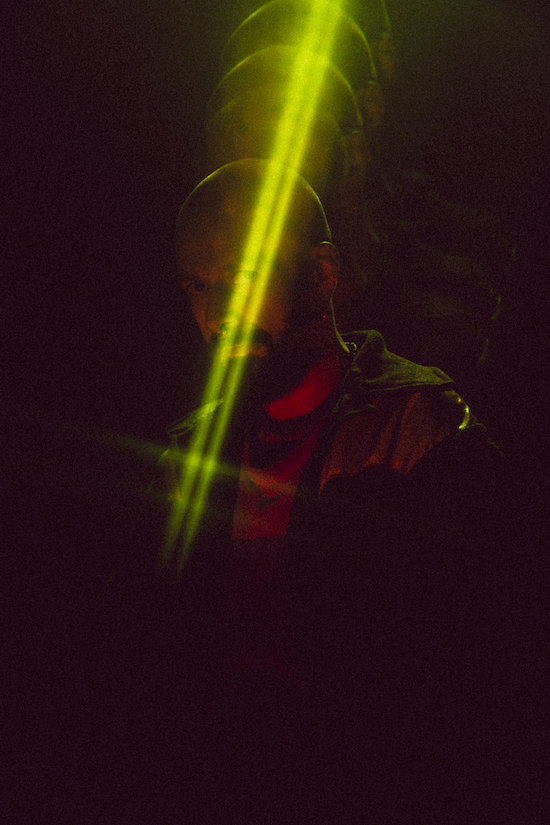Photo by Ishmael Claxton
“You know that tarot card, where the tower’s getting completely destroyed?” asks Ian Lynch. “I had one of those experiences, where everything was broken open and shattered.” Not long before the pandemic the musician, best known for his work with Lankum, had moved back in with his parents to their home in Baldoyle, on the northern outskirts of Dublin. Lockdown soon ensured he’d be stuck there, leaving him stranded and having to deal, as he puts it, “with all this childhood stuff.” In search of coping mechanism he would sing to himself, “but my sister was working from home and getting really pissed off.” He decided to take things outside.
The neighbourhood which had once been part of Dublin’s edgelands, surrounded by fields, had been swallowed further into the capital’s sprawl since Lynch’s childhood. There were spots, however, where deep personal connections had survived. Near his parents’ house was a building site where Lynch once played as a child. “Back in the 50s it would have been a racecourse, but when I was growing up in the 80s it was all abandoned. There were these underground tunnels you could get into. It was quite amazing as a kid who was into D&D.” Two miles away in Howth were the remnants of a factory where his father had once worked. “It was this huge, wide-open space, and there was the cockpit of a huge crane that I could sit in, way up in the air.” Taking his shruti box along with him – a droning Indian instrument similar to a harmonium – he’d sing and record at both sites. “I saw going out to these places and singing as a part of how I was reintegrating all this stuff into my life, rediscovering these happier childhood memories. I’d sit there singing, all day, just having a great time, doing my own thing.”
The recordings he made were deep and resonant, echoing around the tunnels and the cockpit and the former factory floor. The musician hadn’t thought of doing much with them, however, until Dan Callanan of experimental label The Department Of Energy got in touch to ask if Lynch had anything he could contribute to a compilation for St. Brigid’s day called Lee Lines. He took a recording of ‘I’d Rather Be Tending My Sheep’ – a song that the controversial folklorist Ruth Tongue purported to be traditional when she first ‘collected’ it, but that she may well have penned herself – and augmented it with hazy production that makes it sound like a cassette tape dug up from a demolition site. In turn, the song caught the attention of Willie Stewart, who had just started another DIY imprint called Nyahh Records, who asked if Lynch would be interested in releasing a full-length solo album. After some deliberation Lynch took him up on the offer.
What had started as a coping mechanism was coalescing into a project. Lynch started using additional field recordings taken at a local train station, at Bulloch Harbour on Dublin’s south east coast, and at Vilnius Cathedral in Lithuania, and sought additional production help from regular Lankum collaborator John ‘Spud’ Murphy and electronic musician George Brennan. The music thickened into something closer to black metal than folk music. Its personal significance became more concentrated too. “I saw the making of the album as my whole plan for working through various negative ideas I had about myself,” Lynch says. He coined the title …And Take The Black Worm With Me, which emerged through a deep mediation session. “I had a really clear vision of it, this giant black worm.” At first he thought the beast was something to do battle with, but then, towards the end of making the record, another meditation revealed more. “The voice I was given was saying ‘No, that’s not it. You have to embrace the black worm. You have to realise that it’s a part of you.’” This became the narrative of the record, which evolves from the dreadful, overwhelmingly bleak drone of its opener, ‘Glistening, She Emerges’, to a closer called ‘Only The Diceys’ that, though hardly uplifting with its warped arpeggios and twisted country twang, bestows at a firm sense of stillness, resolution, and perhaps even hope.
The record was eventually released, to underground acclaim, in the autumn of 2022. By the following spring, he’d returned to his main band for the release of their fourth album False Lankum. It would soon catapult them to a level of fame they could never have anticipated. Narrowly held off from the Irish number one by Lana Del Rey, they were lauded as “the new Pogues” by The Times, while Mojo compared False Lankum to folk music’s “own OK Computer, its own Dark Side Of The Moon.” It would later top dozens of end-of-year charts (including tQ’s), and it was nominated for the Mercury Prize. The venue for a November benefit gig for the charity Medical Aid For Palestinians was upgraded due to demand, from the 1,500 capacity Vicar Street to the city’s largest venue, the 13,000 capacity 3Arena, which they sold out.

Photo by Miriam Riand
The restorative process of making Take The Black Worm fed into the experience of the relentless touring schedule that came along with the success. “Over the last year gigs have become a much more enjoyable experience,” he says. Before the pandemic he had been considering retiring from the stage altogether. “Every gig, I’d get so stressed out. I was thinking, ‘I don’t even want to do this, we should stop playing gigs with Lankum and just make records.” In the aftermath of One Leg One Eye, “I started to relax more. I stopped stressing about trying to go through the whole gig in my head beforehand, pre-planning what I was going to be saying between songs. I started just trying to get into it and enjoy it. And I was like, ‘Look at that, the gig didn’t fall apart!’ So the gigs have been getting better and better.”
It would be churlish, Lynch says, to complain about Lankum’s 2023. “It’s brilliant, I wouldn’t change anything,” he stresses, but nevertheless there’s a part of him that feels more comfortable in the world of One Leg One Eye. “If it was up to me to decide my experience of being in a band, I’d want it to be that,” he says. “I play small gigs to people that I usually know, the record’s put out by a mate of mine on a small run. I don’t have to worry about anything, It’s literally just all about the creativity and the joy of making music. The freedom to be able to do that without any other voices involved was one of my favourite experiences in making music.”
When the subject of Lankum’s nomination for The Mercury Prize arises, Lynch laughs. “Jesus!” he exclaims. “I felt like we had to pretend to be excited about it, just to be respectful to the label and our manager, because they were really excited.” With it came a slew of commercial engagements that were at odds with Lynch’s DIY ethos, fostered by the anarcho-punk that soundtracked his youth, and early tours with Lankum (then known as Lynched) that saw the band playing squat gigs across Ireland where they were sometimes paid in beer and stew. Before the Mercury ceremony, they were picked up by a car arranged by the awards sponsors, the taxi hiring app Freenow, emblazoned with the False Lankum album art. “They’re like, ‘OK, one thing we’re gonna do is have two of you come into this taxi, we’ll drive round the block and ask you some questions. But the questions they were asking us kept on using the word ‘free.’ They’d be like, ‘So tell us about a time you were making the album and you felt really free.’ I said to your man, ‘Did you ask me that just because this is sponsored by Freenow taxis? And he went, ‘Yeah…’ I was like, ‘You fuckers! This whole thing is an advert for a fucking taxi app!’ I think we all just felt a little bit dirty, to be honest.” Nevertheless, he admits, there was a tradeoff. “It means they’re going to play ‘Go Dig My Grave’ into the TVs of everyone around the UK. I hope there were some people watching us do the second half of the song thinking ‘Why is this on telly? What is this shit?’”

Photo by Ishmael Claxton
Not that False Lankum has forced the band to entirely divorce themselves from the underground. Talk turns to Supersonic Festival in Digbeth, a key nexus point for Britain’s network of leftfield and experimental musicians and artists, which they headlined last September. It reminded him, he says, of his days immersed in the punk scene. “I got a sense of community there that took me back to the festivals I was going to in my 20s around Europe, the K-Town Hardcore Festival in Copenhagen, [anarchist venue] The 1 In 12 Club in Bradford, or the Punx Picnics around the UK. With the kind of stuff we’ve been playing with Lankum, I hadn’t really experienced anything like that for a while. I was really overtaken by it. From the very moment we got there we were dealing with the staff and I was just like, ‘Everyone seems really sound!’ It was all ‘Here, you’re playing tomorrow but I’ll give you some food tokens for today and for Sunday too.’ Chatting away to people from other bands, I just started to become aware that everyone there was really nice, and in a genuine kind of way. Even the security were sound! Seeing them playing with big giant beach balls and throwing them to the crowd one night… that was really mad.”
He’ll be back this summer with One Leg One Eye, as will Lankum bandmate Radie Peat with her project ØXN, a collaboration with Spud, Katie Kim, and Eleanor Myler. Lynch had never planned to turn One Leg One Eye into a live project, “I wanted to make a weirdo bedroom album and not worry about gigs,” he says. “I was quite stubborn about it. I didn’t want to taint the project with the stress of playing live.” Nevertheless, he was won round by Lankum manager Cian Lawless who convinced him to take up an offer from Berlin’s CTM Festival at the beginning of this year. With George Brennan joining Lynch to provide “a lot of deep sub bass” the show was a success, but nevertheless left him with plenty of honing down to do. “You can practise something for years and years and years, then you do one gig and suddenly it becomes apparent what works and what you need to improve. That’s what I’m focused on over the next few months, making this a really good live show.” Considering he was on the verge of quitting gigs altogether before he started reckoning with the black worm, his enthusiasm for the future of One Leg One Eye as a live entity is testament to just how transformative the project has been. “There’s been something that’s changed within myself.”
Ian Lynch performs as One Leg One Eye at this year’s Supersonic Festival, which takes place from 30 August to 1 September. Find tickets, information and the full lineup here


